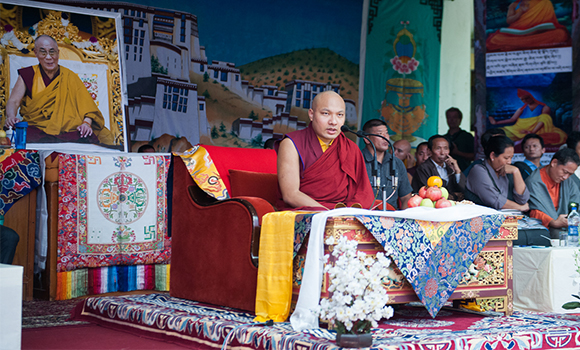
October 5, 2016 – Suja, Himachal Pradesh, India
The Gyalwang Karmapa was invited to be the chief guest ta the Suja School’s celebration of this special day known as Tibet Our Country. Begun in the 1990s, it is a major event for the Tibetan Children’s Village (TCV) schools, which honors and supports the preservation of Tibet’s rich and unique culture with a variety of programs and activities that culminate on this day. The students performed traditional music and dance and presented their poetry on the topic of love and compassion, which was the focus of the day.
From the center of the stage, His Holiness spoke to those who had gathered, recalling that he had visited the school many times and that they had a deep relationship. Turning to the theme for the day, the Karmapa noted that scientists state compassion is a quality that all living beings have from birth but, he noted, we must open the door to it. If we do not use and develop this capacity, its power will deteriorate.
The Karmapa drew an analogy to the development of language. We are all born with the potential to speak, but if a young child grows up in a remote area without human contact, this capacity will no be activated and the child will not be able to talk with others. Likewise, if our innate capacity for love and compassion is not nurtured in the right environment, it will not develop. The Karmapa recommended that in addition to being loving themselves, parents should use the words “compassion” and “love” often in the presence of a child and that these reminders would benefit them.
In Tibetan society, the Karmapa noted, “We pay attention to compassion and love. Parents and grandparents recite prayers that include all living beings, vast as the sky, and make wishes that they have happiness and be free of suffering.” Likewise, Tibetans recite the six-syllable mantra of Avalokiteshvara, who embodies compassion. “In brief,” he said, “we are a people who have a great interest in compassion and love. The social environment of Tibetan society provides the conditions for their growth.”
But sometimes, he noted, we can talk a lot about compassion and love, but they remain a mere habit or a custom, passed down through the generations without particular attention being paid to them. It is possible that we could often recite the mantra, but there is not much stable power to our practice. Why is this so? If practice is just following some custom, a philosophical position, or an ingrained habit, it will not truly benefit us in our daily lives.
Looking within, we can search for a mental feeling, or an experience, of compassion and love. If see that they are growing, then our practice is effective. If we are inspired to develop them, it will definitely be possible, and then through love and compassion, we can benefit both others and ourselves. The Karmapa counseled that we should turn our attention to developing our meditation and continue our practice throughout our entire life.
In the world these days, he remarked, compassion and loving-kindness, are in decline, so the time has come for us to be concerned and take responsibility to do all we can to help. This era in which we live is filled with immense changes so we cannot sit just on the sidelines and relax. We must become involved while focusing our minds clearly and thinking deeply.
The Karmapa concluded his talk with praise for the principal, staff, and teachers of Suja School. He complemented them for shouldering their responsibilities and working together well and encouraged them to continue: “We can collaborate, mutually benefitting each other, and also put our energy together to help the entire society.” On this positive note, the Karmapa concluded his talk.
[Best_Wordpress_Gallery id=”6″ gal_title=”TCV Suja school”]


